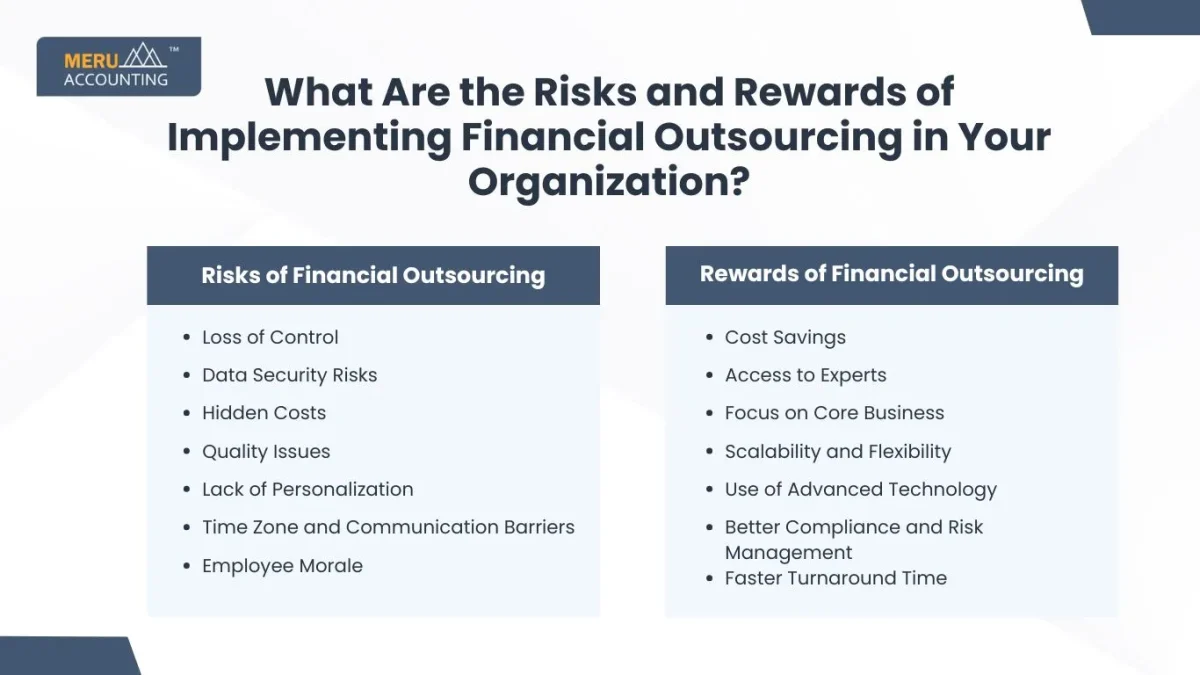What Are the Risks and Rewards of Implementing Financial Outsourcing in Your Organization?
Financial outsourcing is a growing trend in many firms today. It means hiring outside experts to manage finance tasks instead of doing them in-house. This move can save both time and money, though it brings some risks. By outsourcing, firms gain skilled help and use tools that may cost too much to build on their own. It also helps firms work better and aim more at growth. Picking the right provider and guarding data are key. Strong deals, checks, and clear talks keep control in place.
What Is Financial Outsourcing?
Financial outsourcing means hiring outside firms to handle financial tasks. These may include payroll, accounting, tax work, and planning. It helps companies focus on core goals instead of daily finance work.
Small and mid-sized firms choose financial outsourcing to lower costs. It also brings expert skills and the latest tools. This boosts accuracy and supports legal and tax compliance.
Risks of Financial Outsourcing
1. Loss of Control
- You depend on outsiders for key data.
- Harder to manage day-to-day tasks.
- Changes take longer to apply.
2. Data Security Risks
- Sharing sensitive data with third parties is risky.
- There’s a chance of data leaks or hacks.
- Must ensure the outsourcing firm has good security.
3. Hidden Costs
- Some contracts have extra or hidden fees.
- Long-term costs may rise over time.
- You must read the agreement carefully.
4. Quality Issues
- Not all providers offer top-quality work.
- Mistakes in finance can be costly.
- Must choose a firm with a good track record.
5. Lack of Personalization
- Outsourced teams may not know your business well.
- They might give standard solutions, not custom ones.
- Communication gaps can affect service quality.
6. Time Zone and Communication Barriers
- If the provider is overseas, time differences may cause delays.
- Language or cultural barriers can also create problems.
- Regular updates are needed to stay on track.
7. Employee Morale
- Internal staff may feel insecure about their jobs.
- It can affect morale and trust in management.
- Clear communication helps reduce this fear.

Rewards of Financial Outsourcing
1. Cost Savings
- Reduces the need for full-time staff.
- Saves on salaries, training, and office space.
- External firms often have efficient tools to lower costs.
2. Access to Experts
- Financial outsourcing gives you access to skilled professionals.
- These experts keep up with changes in laws and rules.
- You get better advice and fewer errors.
3. Focus on Core Business
- Internal teams can focus on growth and operations.
- Leaders spend less time on routine finance work.
- Business goals get more attention.
4. Scalability and Flexibility
- You can scale services to fit changing needs.
- You pay only for what you use.
- Good for fast-growing companies or seasonal businesses.
5. Use of Advanced Technology
- Outsourcing firms often use modern financial tools.
- These tools improve accuracy and reduce errors.
- Small firms get access to high-end systems at a low cost.
6. Better Compliance and Risk Management
- Financial experts help meet laws and rules.
- They ensure accurate reports and on-time filing.
- Reduces the risk of fines or audits.
7. Faster Turnaround Time
- External teams often deliver results quicker.
- They use set processes to meet deadlines.
- It helps in quick decision-making.
When Should You Consider Financial Outsourcing?
- When the company is growing rapidly and needs to scale financial operations efficiently.
- When deeper financial expertise is needed than what the team has.
- When reducing operating costs is a priority.
- When the internal team is overloaded and productivity is affected.
- When improving compliance and minimizing financial risk is essential.
How to Choose the Right Financial Outsourcing Partner
1. Check Experience and Skills
- Look for firms with industry experience.
- Ensure they understand your business type.
2. Verify Security Measures
- Ask about data protection and encryption.
- Check for compliance with global standards like GDPR.
3. Understand Their Technology
- Know what tools and systems they use.
- Make sure they are compatible with your current systems.
4. Ask for References
- Talk to their current or past clients.
- Ask about service quality and reliability.
5. Start Small
- Begin with a small task or project.
- Test their work before giving bigger responsibilities.
6. Clear Communication
- Set clear terms and expectations.
- Plan regular meetings to review work.
Steps to Successfully Implement Financial Outsourcing
1. Define Your Goals
- Know what tasks you want to outsource.
- Set clear targets and expectations.
2. Choose the Right Provider
- Select a provider with the right skills and tools.
- Check reviews and performance history.
3. Sign a Detailed Contract
- Include cost, timelines, and service levels.
- Define data privacy terms clearly.
4. Train Both Teams
- Let your team know how the process will change.
- Share the needed info with the external team.
5. Monitor and Review
- Track results regularly.
- Adjust tasks and roles if needed.
Real-Life Examples of Financial Outsourcing
1. Small Retail Business
- Outsourced payroll and taxes.
- Saved 30% on finance costs.
- The owner had more time for sales.
2. Tech Startup
- Hired an external CFO service.
- Improved budgeting and cash flow.
- Helped in raising investor funds.
3. Non-Profit Organization
- Outsourced accounting work.
- Improved reporting and compliance.
- Reduced errors and audit risks.
Balancing the Risks and Rewards
- Financial outsourcing brings clear benefits, like saving costs and expert help.
- Still, risks such as data leaks and loss of control must be handled well.
- A strong plan, careful choice of partners, and regular checks lead to success.
- Good communication and clear contracts set the right goals and limits.
- Strong security steps help guard sensitive financial data from harm.
- Building trust with providers helps keep work smooth and results high.
Financial outsourcing is a smart move when used wisely. It can lower costs, improve results, and let your team focus on what matters most. But like any plan, it has risks. Clear goals, the right provider, and regular checks help your business gain rewards while staying safe from risks.
Meru Accounting offers reliable financial outsourcing services made to fit your business needs. With a skilled team and modern tools, they ensure accuracy, data safety, and timely work. Our client-first approach helps businesses grow with confidence and peace of mind.
FAQs
- What is Financial Outsourcing?
It means giving financial work, like payroll or taxes, to an external expert or firm. - Is Financial Outsourcing only for big companies?
No, small and medium businesses also use it to save money and time. - Is it safe to outsource financial work?
Yes, if the provider has good security systems and follows strict privacy rules. - Can outsourcing affect my control over finances?
Yes, but regular updates and clear contracts can help you stay in control. - How do I know if the provider is good?
Check reviews, ask for client references, and test with a small task first. - Will outsourcing save my company money?
Usually, yes—especially on salaries, tools, and training. - What kind of financial tasks can I outsource?
You can outsource payroll, bookkeeping, accounting, tax filing, and even CFO services.








